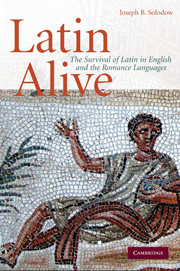Book contents
- Frontmatter
- Contents
- List of Maps
- Acknowledgments
- 1 Introduction
- PART ONE LATIN
- 2 The Career of Latin, I
- 3 The Career of Latin, II
- 4 Latin at Work, I
- 5 Latin at Work, II
- 6 Vulgar Latin
- PART TWO THE ROMANCE VOCABULARY
- PART THREE PROTO-ROMANCE, OR WHAT THE LANGUAGES SHARE
- PART FOUR EARLIEST TEXTS AND FUTURE DIRECTIONS, OR WHERE THE LANGUAGES DIVERGE
- Suggestions for Further Reading
- General Index
- Index of English Words
6 - Vulgar Latin
Published online by Cambridge University Press: 05 June 2012
- Frontmatter
- Contents
- List of Maps
- Acknowledgments
- 1 Introduction
- PART ONE LATIN
- 2 The Career of Latin, I
- 3 The Career of Latin, II
- 4 Latin at Work, I
- 5 Latin at Work, II
- 6 Vulgar Latin
- PART TWO THE ROMANCE VOCABULARY
- PART THREE PROTO-ROMANCE, OR WHAT THE LANGUAGES SHARE
- PART FOUR EARLIEST TEXTS AND FUTURE DIRECTIONS, OR WHERE THE LANGUAGES DIVERGE
- Suggestions for Further Reading
- General Index
- Index of English Words
Summary
CANONIZATION OF CLASSICAL LATIN
Up to this point, I have called the language simply “Latin,” as if it were a single, unified entity. Now is the time to make an important distinction. The works of such writers as Cicero and Caesar were written in a specially refined, grammatically uniform Latin. This variety of the language, described in the preceding chapters, may be called “Classical Latin.” It is still present in the modern world. The Latin that is taught in school, the Latin that has always been taught in the schools, is an “eternal” Classical Latin, with unchanging vocabulary, syntax, and forms.
But Classical Latin is not exactly the ancestor of the modern languages; the Latin written by Cicero and Caesar and taught at school was not the direct source of Spanish, Italian, and French. Instead, those languages derive from a different variety, which may be called “Vulgar Latin.” “Vulgar” is not a judgmental term here, but has its etymological sense, “of the vulgus, the common people.”
We stand at a fork in the road of our story, and from here on must abandon Classical Latin and follow the course of Vulgar. Nonetheless, Classical, though not the direct parent of the Romance languages, continued to affect them mightily at every stage. As we just saw, it shaped some syntactic norms in modern times, and it has always been available as a source when new terms were needed – optimism in the eighteenth century.
- Type
- Chapter
- Information
- Latin AliveThe Survival of Latin in English and the Romance Languages, pp. 107 - 124Publisher: Cambridge University PressPrint publication year: 2010



